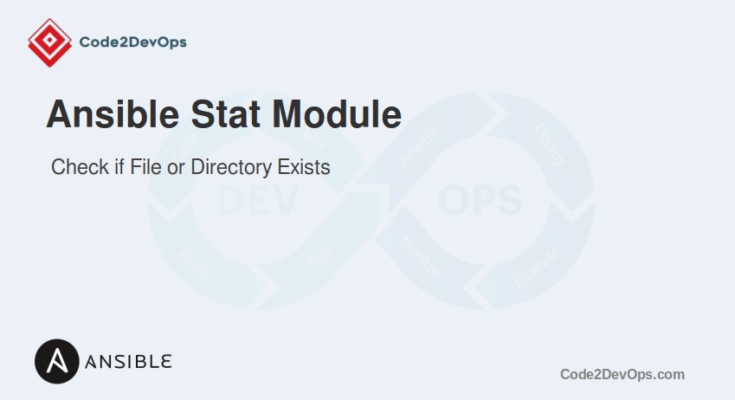When automating tasks with Ansible, you often need to check if a specific file or directory exists on a remote host. This can be useful in scenarios where certain actions are only performed if a particular file or folder is present. In Ansible, this is typically done using the stat module, which gathers information about files or directories.
In this guide, we will explore how to use the Ansible stat module to check if a file or directory exists with some practical examples.
Table of Contents
Using the stat Module
The stat module in Ansible is used to retrieve information about a file or directory. It provides various attributes like the file size, permissions, and whether the file or directory exists.
Here is the basic syntax:
- name: Check file or directory status
ansible.builtin.stat:
path: /path/to/file_or_directoryTo determine if the file or directory exists, we use the stat.exists attribute.
Check if a File Exists
In this example, we will check if a specific file exists on the remote host.
---
- name: Check if a file exists
hosts: all
tasks:
- name: Check if the file exists
ansible.builtin.stat:
path: /tmp/example.txt
register: file_status
- name: Display file existence status
debug:
msg: "File exists"
when: file_status.stat.existsIn this playbook:
- stat Module: Checks the status of the file /tmp/example.txt.
- Register Variable: Store the output of the stat module in a variable called file_status.
- Conditional Check: Uses the Ansible when conditionals with debug module to display a message if the file exists.
If the file exists, you will see:
TASK [Display file existence status] *******************************************
ok: [target_host] => {
"msg": "File exists"
}If the file does not exist, the task is skipped.
skipping: [target_host]Check if a Directory Exists
Checking for a directory is similar to checking for a file. In this example, we will verify if the /var/log/myapp directory exists.
---
- name: Check if a directory exists
hosts: all
tasks:
- name: Check if the directory exists
ansible.builtin.stat:
path: /var/log/myapp
register: dir_status
- name: Display directory existence status
debug:
msg: "Directory exists"
when: dir_status.stat.existsIn this example playbook:
- We use the stat module to check the status of the directory /var/log/myapp.
- The existence of the directory is determined using dir_status.stat.exists.
If the directory exists, you will see the below output:
TASK [Display directory existence status] **************************************
ok: [target_host] => {
"msg": "Directory exists"
}If the directory does not exist, the task is skipped:
skipping: [target_host]Perform an Action Based on File/Directory Existence
You can perform specific tasks based on whether a file or directory exists. For example, you may want to create a file if it does not exist using the when condition.
---
- name: Create a file if it does not exist
hosts: all
tasks:
- name: Check if the file exists
ansible.builtin.stat:
path: /tmp/config.cfg
register: file_check
- name: Create the file if it does not exist
ansible.builtin.file:
path: /tmp/config.cfg
state: touch
when: not file_check.stat.existsIn this example:
- We check if the file /tmp/config.cfg exists using the stat module.
- If the file does not exist (not file_check.stat.exists), the file module creates it.
Check File Permissions and Change Them If Not as Expected
In addition to checking for the existence of a file or directory, you may need to verify its permissions and ensure they meet your requirements.
In this example, we will check the permissions of a file /tmp/secure_file.txt and ensure that it has 0644 permissions.
---
- name: Check and Correct File Permissions
hosts: all
tasks:
- name: Check the permissions of the file
ansible.builtin.stat:
path: /tmp/secure_file.txt
register: file_permission_check
- name: Display the current file permissions
debug:
msg: "Current permissions are: {{ file_permission_check.stat.mode }}"
- name: Set correct file permissions if not as expected
ansible.builtin.file:
path: /tmp/secure_file.txt
mode: '0644'
when: file_permission_check.stat.mode != '0644'In this example:
- The stat module retrieves the current permissions of /tmp/secure_file.txt.
- Using the debug module, we print the current permissions of the file.
- The file module sets the permissions to 0644 only if they do not match the expected value.
Conclusion
In this article, we explored how to use the Ansible stat module to check if a file or directory exists. This is a common task in many automation scenarios, allowing you to conditionally perform actions based on the presence of files or directories. By using the stat module, you can write more robust and reliable Ansible playbooks.
FAQs
1. How can I create a file if it does not exist in Ansible?
You can use the stat module to check if a file exists and the file module with state: touch to create it if it does not exist.
2. How do I check if a file is a directory in Ansible?
The stat module provides the isdir attribute. If it returns true, the path is a directory. Use this in conditional statements to distinguish between files and directories.
3. Can I check for symbolic links using Ansible's stat module?
Yes, the stat module includes an islnk attribute. If it returns true, the specified path is a symbolic link.
4. How do I change the owner and group of a file in Ansible?
Use the file module with owner and group parameters to update the ownership of a file or directory.




